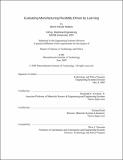Evaluating manufacturing flexibility driven by learning
Author(s)
Nadeau, Marie-Claude
DownloadFull printable version (914.3Kb)
Other Contributors
Massachusetts Institute of Technology. Technology and Policy Program.
Advisor
Randolph E. Kirchain, Jr. and Richard Roth.
Terms of use
Metadata
Show full item recordAbstract
A defining feature of modern industry is operating in a context of nearly continuous technological change. Nevertheless, industrial decision-makers must select technologies and implement production strategies even in the face of known-to-be-incomplete information and environmental uncertainties. Further complicating the picture, the performance, including the economic performance, associated with novel technology options is likely to change over time. To address this problem, two approaches are possible: improving the quality of currently available information, and implementing flexible production strategies. The present work characterizes how the former approach impacts the valuation of the latter. First, a dynamic approach integrating learning curves and process-based cost modeling is used to examine learning in manufacturing, thus allowing decision-makers to incorporate information about expected technology evolution into their economic evaluations of technology. The approach is applied to an automotive assembly process, and quantifies the cost impacts of learning improvements in manufacturing time, downtime, and defect rates. Analysis can be used to focus learning activities on primary learning operational drivers, and to forecast cost improvements for a novel process. Flexibility strategies are often focused on capital-intensive processes, while labor-intensive processes are thought to be inherently flexible. The existence of learning effects, however, implies that labor flexibility has costs and, potentially, benefits in the context of uncertainty. A simple automotive assembly case is used here to illustrate the impact of manufacturing learning on labor flexibility and its economic value. A framework using cash-flow and decision tree models is introduced to quantify the costs and benefits of acquiring worker flexibility, and improve information available for strategic decision-making in labor-intensive systems. The front-end characterization of the technical drivers of learning provides insight into how the value of flexibility can be impacted at the operational level, enabling managers to prioritize improvements and minimize the costs of flexibility.
Description
Thesis (S.M. in Technology and Policy)--Massachusetts Institute of Technology, Engineering Systems Division, 2009. This electronic version was submitted by the student author. The certified thesis is available in the Institute Archives and Special Collections. Page 126 blank. Cataloged from student submitted PDF version of thesis. Includes bibliographical references (p. 110-115).
Date issued
2009Department
Massachusetts Institute of Technology. Engineering Systems DivisionPublisher
Massachusetts Institute of Technology
Keywords
Engineering Systems Division., Technology and Policy Program.